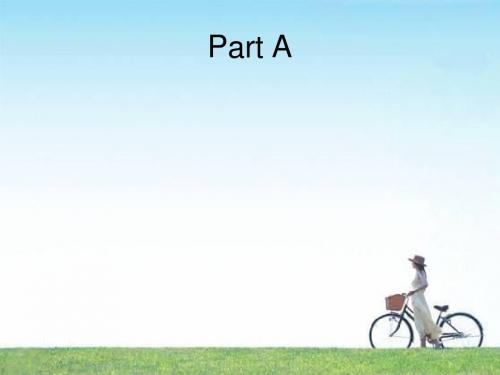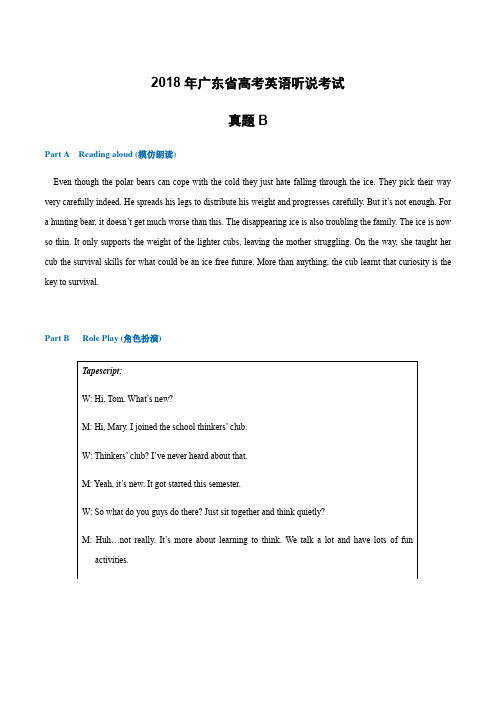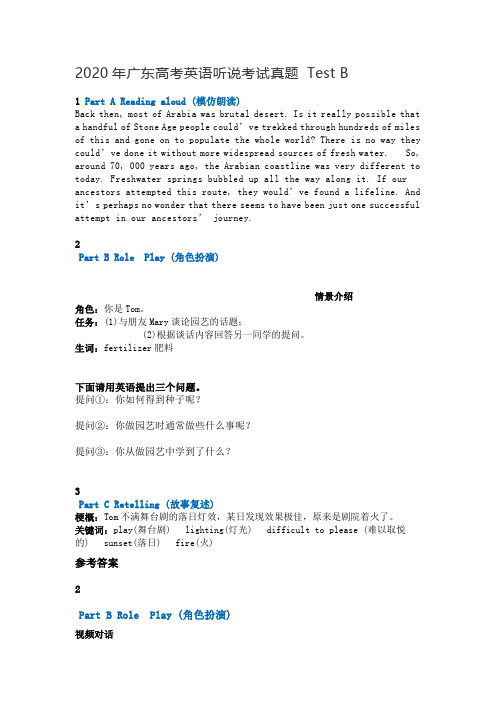广东高考英语听说考试Part B角色扮演经典句型
- 格式:doc
- 大小:39.00 KB
- 文档页数:2

2023年广东高考英语听说考试真题Test BPart A Reading aloud (模仿朗读)Music. It’s the universal language we all know, we all feel. It holds the remarkable power to bring us together in moments both big and small. A single lyric /'lɪrɪk/ can sweep you up and pull you back to a treasured moment lost in time. It sees no lines of race or nationality. It’s universal, generational, multicultural. It gives us hope, joy, harmony, harmony within ourselves and with one another. The great power of music binds us all together, especially when we need it most, when the world seems to need it most. Music isharmonious /hɑrˈmoʊniəs/. And the world can be, too.2Part B Role Play (角色扮演)情景介绍角色:你是Mary。
任务:(1) 与朋友Tom谈论维修咖啡馆的话题;(2) 根据谈话内容回答另一朋友的提问。
生词:repair café维修咖啡馆下面请用英语提出三个问题。
1. 什么是维修咖啡馆?2. 这类咖啡馆很流行吗?3. 那它们还提供什么呢?3Part C Retelling (故事复述)梗概:Mary用自己的画作去Tom的店里换颜料,后将获奖的画作送给Tom。


2018年广东省高考英语听说考试真题BPart A Reading aloud (模仿朗读)Even though the polar bears can cope with the cold they just hate falling through the ice. They pick their way very carefully indeed. He spreads his legs to distribute his weight and progresses carefully. But it’s not enough. For a hunting bear, it doesn’t get much worse than this. The disappearing ice is also troubling the family. The ice is now so thin. It only supports the weight of the lighter cubs, leaving the mother struggling. On the way, she taught her cub the survival skills for what could be an ice-free future. More than anything, the cub learnt that curiosity is the key to survival.Part B Role Play (角色扮演)三问部分:Question 1: What activities do you have?Answer 1: Well, we have many activities such as learning to ask questions, reading books, writing reports, debating and so on. The most impressive part is asking questions. I still remember the first time when I was there.I didn’t even know what to ask.Question 2: Is it really difficult to ask questions?/ Is it really difficult to ask?/ Is it really hard to ask questions?/ Is it really hard to ask?Answer 2:Yes, I find it hard usually because I don’t know much about a topic. That’s why we are encouraged to read more. Last week, for example, we were recommended a book on technology and human life.This week, we came together with our book reports, asking questions and exchanging ideas. Next week, we are going to have a debate on the question: Will humans be replaced by robots? I really learned a lot through these activities.Question 3: How do I join the club?/ How can I join the club?Answer 3: Well, at the beginning of each semester, the club recruits new members. You can go there and fill in an application form. Usually you will be interviewed on the same day. Then the club will give you reply inthree days. And you will know whether you are admitted or not.五答部分:Question 1: What club did Tom join?Answer 1: The school thinkers’ club./ He joined the school thinkers’ club./ Tom joined the school thinkers’ club Question 2: When did the club start?Answer 2: This semester./ This term./ It started this semester./ It started this term./ The club started this semester./The club started this term.Question 3: What is the most impressive part of the club activities for Tom?Answer 3: Asking questions./ The most impressive part is asking questions./ The most impressive part of the club activities for Tom is asking questions.Question 4: What will the club members do next week?Answer 4: Have a debate./ They will have a debate next week./ The club members will have a debate next week./ Have a debate on the question: Will humans be replaced by robots?/ They will have a debate on the question: Will humans be replaced by robots?Question 5: When will the applicants be interviewed?Answer 5: On the same day as they fill in an application form./ After they fill in an application form./ On the same day when they fill in an application form.Part C Retelling (故事复述)参考复述:Tom loved to explore. He often walked in the mountains to look for new things. Tom and his friend wanted to climb a mountain that no one else knew much about, so they were on their own way to the top of the mountain. They found a cave and turned on their flashlights. As they walked deeper into the cave, they entered a big room. The walls of the room were filled with drawings of deer, trees and people, done long ago. The drawings were clearly very old, but they were amazing. Tom took many photographs of all the drawings, and then he left with his friend, promising to come back. But two weeks later, the cave was destroyed by an earthquake. Tom’s pictures were the only proof that the cave ever existed.。

1Part A Reading aloud (模仿朗读)It was the beginning of a totally new way of life. But there was another very important difference between these hunter-gatherers and any of their predecessors. They were settling down. A huge shift, which would help spark Europe-wide revolution. Communities settled down and populations expanded. This could have driven the need to start producing food. And as farming spread, the landscape was transformed. Forests were cleared and villages, then towns, then cities would grow, founded by descendants of the small groups of pioneers who first entered Europe around 45, 000 years ago. Those early Europeans were people just like you and me.2Part B Role Play (角色扮演)情景介绍角色:你是Tom。
任务:(1)与同学Mary谈论古扇展览的话题;(2)根据谈话内容回答另一同学的提问。
生词:ivory象牙下面请用英语提出三个问题。
提问①:我从哪里能得到这个展览的票呢?提问②:这些问题是关于什么的呢?提问③:展览上有多少把扇子?3 Part C Retelling (故事复述)梗概:Tom以为奶奶被邻居骗钱,后来发现邻居只是一个来帮忙的小男孩。

2020年广东高考英语听说考试真题Test B1Part A Reading aloud (模仿朗读)Back then, most of Arabia was brutal desert. Is it really possible that a handful of Stone Age people could’ve trekked through hundreds of miles of this and gone on to populate the whole world? There is no way they could’ve done it without more widespread sources of fresh water. So, around 70, 000 years ago, the Arabian coastline was very different to today. Freshwater springs bubbled up all the way along it. If our ancestors attempted this route, th ey would’ve found a lifeline. And it’s perhaps no wonder that there seems to have been just one successful attempt in our ancestors’ journey.2Part B Role Play (角色扮演)情景介绍角色:你是Tom。
任务:(1)与朋友Mary谈论园艺的话题;(2)根据谈话内容回答另一同学的提问。
生词:fertilizer肥料下面请用英语提出三个问题。
提问①:你如何得到种子呢?提问②:你做园艺时通常做些什么事呢?提问③:你从做园艺中学到了什么?3Part C Retelling (故事复述)梗概:Tom不满舞台剧的落日灯效,某日发现效果极佳,原来是剧院着火了。

1Part A Reading aloud (模仿朗读)It was the beginning of a totally new way of life. But there was another very important difference between these hunter-gatherers and any of their predecessors. They were settling down. A huge shift, which would help spark Europe-wide revolution. Communities settled down and populations expanded. This could have driven the need to start producing food. And as farming spread, the landscape was transformed. Forests were cleared and villages, then towns, then cities would grow, founded by descendants of the small groups of pioneers who first entered Europe around 45, 000 years ago. Those early Europeans were people just like you and me.2Part B Role Play (角色扮演)情景介绍角色:你是Tom。
任务:(1)与同学Mary谈论古扇展览的话题;(2)根据谈话内容回答另一同学的提问。
生词:ivory象牙下面请用英语提出三个问题。
提问①:我从哪里能得到这个展览的票呢?提问②:这些问题是关于什么的呢?提问③:展览上有多少把扇子?3 Part C Retelling (故事复述)梗概:Tom以为奶奶被邻居骗钱,后来发现邻居只是一个来帮忙的小男孩。
广东高考英语听说考试Part B角色扮演经典句型
1. 一般疑问句
结构: be/助动词/情态动词+主语+其他成分?
花那么多时间在电脑游戏方面有必要吗?Is it necessary to spend so much time on computer games?
你打算参加即将到来的运动会吗?Are you going to take part in the coming sports meeting?
一个人的爱好和性格之间有什么关系吗?Is there any relationship b etween one’s hobby and his character? 住学校宿舍是否较便宜?Is it cheaper to live in a university dormitory than in a private house?
你想来点奶酪吗?Would/Do you like some cheese?
网上购物将会取代传统的购物方式吗?Will online shopping take the place of the traditional shopping?
你是否拿了我放在桌面的钥匙?Did you take the key which put on the table by me?
你是否知道这里禁止吸烟?Do you know that smoking is forbidden here?
你还没有完成老师布置的作业?Haven’t you finished the homework assigned by the teacher ?
2. 特殊疑问句
结构:特殊疑问词+be/助动词/情态动词+主语+其他?
1)what & which
今天星期几?What day is today?
今天几号?What is the date today?
今天天气如何?What is the weather like today?
他们下一步打算做什么?What are they going to do next?
David 加入了哪一组?Which group did David take part in?
你打算到哪个大学学习?Which university are you going to study in?
吸烟对我们有什么影响?What effect does smoking have on us?
当我们学习英语时,应该注意什么?What should we pay attention to when we learn English?
为了保持健康我们应该有什么样的饮食?What kind of diet should we have to keep healthy?
这个男孩的妈妈年轻时喜欢干什么?What did the boy’s mother enjoy doing when she was young?
2)who /whom when /where/why
谁将会做一个关于如何节约用水的讲座?Who will make a speech about how to save water?
他们正在焦急地等待谁?Whom are they anxiously waiting for?
商店的营业时间是?When is the shop open for business?
你什么时候有空来看一下房子?When are you free to see the apartments?
你在哪里找到你上周丢失的车?Where did you find the car that you lost last week?
最近的汽车站在哪里?Where is the nearest bus station from here?
他们为什么不喜欢传统的节日?Why don’t they like the traditional Festivals?
Carl为什么不同意星期五做手术?Why doesn’t Carl agree to have the operation on Friday?
说话者为什么为自己的健康担心?Why did the speaker worry about health?
3)how / how often/ how much / how many / how long / how far…
时间怎么安排?How is the schedule arranged?
Mary 和她的同学相处得怎么样?How does Mary get along with her classmates?
这个女士多久要参加一次部门会议?How often does the woman attend the department meeting?
超市里一块饼干多少钱?How much is a piece of cake in the supermarket?
火车单程票票价?How much do we pay for a single ticket?
他们中有多少人下周四会动身去上海?How many of them will leave for Shanghai next Thursday?
有多少人在事故中死亡?How many people were killed in the accident?
从这个房子到最近的地铁有多远?How far is it from the house to the nearest subway station?
你已经在这儿呆了多长时间了?How long have you stayed here?
从本处乘火车到那个景点的时间?How long does it take to go by train from here to the place of interest?你要怎么去,坐火车还是乘飞机?How are you getting there, by train or by plane?
3. 选择疑问句
结构:一般疑问句+or+其他成分? / 特殊疑问句 +or+其他成分?
他喜欢呆在这儿还是回家?Does he prefer to stay here or go back home?
你将搭乘飞机还是火车离开?Will you leave by air or by train?
他何时动身去伦敦,今天还是明天?When will he leave for London, today or tomorrow?
哪个城市大些,北京还是纽约?Which city is bigger, Beijing or New York?
猫和狗你更喜欢哪一种?Which do you prefer, cats or dogs?
4. 反义疑问句
结构:陈述句+简短疑问(前肯定后否定;前否定后肯定)?
那里的天气并不冷,对吗?The weather there isn’t very cold, is it?
你会参加这个周末的派对,是吗?You are going to the party this weekend, aren’t you?
你一定把这事告诉她了,不是吗?You must have told her about it, haven’t you?
我们将会永远记住这次的经历,对吗?We will remember this experience forever, won’t we?
很多人日本人在地震中丧生,对吗?Many Japanese were killed in the earthquake, weren’t they?
5. 变异问句
您能告诉我一些关于期中考试的事情?Can you tell me something about the Mid-term exam?
您介意告诉我是谁负责这个部门吗?Would you mind telling me who is in charge of the department?
他认为什么是最大问题?What does he consider is the biggest problem?
你认为会议将会在哪里举行?Where do you suppose the meeting will take place?。